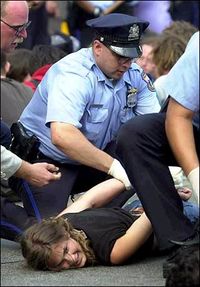UnNews:Miranda rights expanded
22 January 2007
WASHINGTON, D. C. - The U. S. Supreme Court has ruled that the Miranda rights that police read to suspects at the time of an arrest must be expanded to include advisories concerning statements and behavior by police officers during arrests and after arrests are made.
Until recently, police have been allowed to lie to suspects whereas suspects may be subjected to severe penalties for lying to police officers. “This is an unjust advantage in favor of authorities,” Justice David Souter contended. “No one should be allowed to lie with impunity in such matters, least of all law enforcement personnel.”
Although police almost always read suspects their Miranda rights upon arresting them, they also often make false promises to them. They suggest that they will intercede on their behalf to see that their cooperation is factored into their sentencing whereas, in fact, it is the judge’s prerogative to determine the sentences that perpetrators receive if they are convicted.
Sometimes, police will imply that they will let a suspect go if he or she will confess to a crime or implicate someone else in the commission of the crime. “Be honest with me, and I may not have to arrest you,” an officer might say.
“That’s wrong,” opined Justice Ruth Bader Ginsburg. “It’s also disgusting.”
Although both Chief Justice William Rehnquist and Justice Clarence Thomas said that they see nothing wrong with allowing police to lie to suspects, they were outnumbered by their seven colleagues. The result is good news for suspected criminals and bad news for police. Henceforth, the Miranda rights must include warnings that the police may lie to gain a confession, to facilitate the incrimination of a suspect or other party, or to intimidate arrestees.
Specifically, these lines must be added to the existing Miranda rights:
- I may and will make false statements or inaccurate declarations or use half-truths to create a false sense of security on your part, to gain a confession of guilt from you, to facilitate your or someone else’s incrimination, or to create doubt and/or anxiety concerning your possible or likely fate as a result of the allegations that I make concerning your conduct or the conduct of another person or other persons. Therefore, it is best for you to refuse to say anything to me or to anyone other than your attorney. I strongly caution you to remain silent.
Police say that these requirements are onerous and will interfere with their enforcement of the law.
“They’re fair and reasonable,” Justice Souter countered.
“They’re just,” Justice Ginsburg agreed.
Alvin Simon Theodore, of the American Civil Liberty Union (ACLU), praised the high court’s ruling and advised arrested Americans “to say nothing to anyone but your lawyer.”
Ginsberg and Souter added regarding their future agenda, saying, "We hope to impose an obligation requiring that the arresting police officers also act as attorneys for the accused. This will forbid them from giving testimony or any other evidence against the arrestee, and will remove all incentive of the police to arrest anyone, and therefore unfairness in the criminal justice system will be totally eliminated." "See how smart we are?" they asked.
Source[edit | edit source]
- Lotta Lies "You have the right to. . . do what?" Instant News, 28.88 seconds ago
